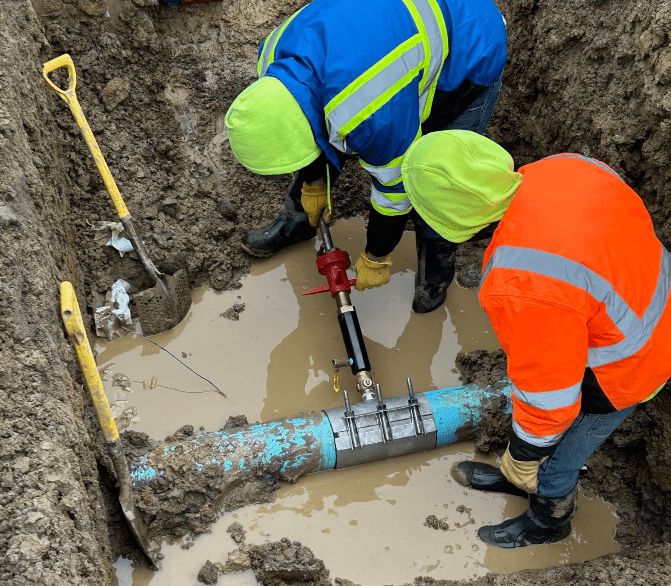
(Photo from Rural Water Strong)
- MsRWA CEO Kirby Mayfield says bigger government, more regulations and red tape will only drive up costs for rural water association members.
Nearly three years ago, the City of Jackson, Mississippi experienced a collapse of its water and sewer systems with widespread outages and safety concerns. Predictably, in reporting Jackson’s water and sewer crisis, the media focused on who was to blame for the City’s failure to provide safe and reliable water services to its citizens. The organization which helped quickly fix Jackson’s immediate water shortage problems and stabilize the water system was largely ignored by the media.
Because of the expertise and training of members of the Mississippi Rural Water Association, our members came to the rescue during the Jackson water crisis. In 2023, the Mississippi Legislature recognized the “extraordinary efforts” by our organization’s members and formally commended our group in Senate Resolution 10 saying, “on behalf of the citizens of the City of Jackson and the State of Mississippi, we do hereby commend and thank the Mississippi Rural Water Association Emergency Response Cooperative for their assistance during the Jackson water crisis.” Governor Tate Reeves also recognized our organization for helping during the Jackson water crisis when he stated, “I want to sincerely thank the Mississippi Rural Water Association for the important role that they played.”
Some of the best-operated and managed water and wastewater systems in the nation are located right here in Mississippi. I’m confident that 99% of our members are operating top notch, well-managed water systems. Unfortunately, due to some rare occurrences where issues need to be resolved, rural water systems in Mississippi have taken some punches recently from those that are quick to sensationalize issues. The majority of media reports regarding these issues are baseless, misleading and unfair to our water association members. I want to set the record straight about how rural water associations are helping provide real solutions to water and wastewater problems that will arise in years ahead.
Today, the 1,243 member organizations of the Mississippi Rural Water Association work hard to provide good, safe and affordable water and services to customers across Mississippi. In total, the members of our association serve more than 1.4 million people, mostly in rural areas, as well as numerous municipalities, covering more than one-third of the population of Mississippi.
Providing this kind of sustainable, reliable rural water service every day brings a unique set of challenges that we are constantly addressing. Through training, education, system upgrades and other initiatives, the Mississippi Rural Water Association works closely with our members as well as state and federal regulatory agencies to ensure compliance with state and federal law.
Each rural water association is governed by a Board of Directors, the members of which are elected by the association. Oversight and regulation of each rural water group is handled by the U.S. Environmental Protection Agency, the Mississippi State Department of Health, the Mississippi Department of Environmental Quality, the Mississippi Secretary of State’s office, the Mississippi Non-Profit Corporation Act and to some degree, the Mississippi Public Service Commission.
In 1998, the Mississippi Legislature began requiring mandatory training for all persons serving on their water association board of directors. Just two years ago, additional legislation was adopted requiring even more training for all board members. This elevated training level is making a positive difference in helping water systems be more responsible, accountable and sustainable—now and for the future.
The primary source of funding for each water association in Mississippi comes from customers paying their bills. And while nobody likes a rate increase, delaying rate increases year after year, while a system needs maintenance, repairs or upgrading, only makes a rate increase more painful and usually more costly than rescaling such rates on a timely basis.
Federal funding from the American Rescue Plan Act (ARPA) has been beneficial in funding improvements to water systems in our state, with a total of $404 million allocated to help 193 rural water systems who need the most assistance. Already, there are 77 new water wells, 27 new elevated tanks, 88 tank rehabilitation projects and 5 million linear feet of water lines being laid as part of round one of ARPA funding. In round two of ARPA funding, there were extra incentives for system consolidation, merger and acquisition of systems, and as a result, 29 water systems have become 14 systems.
As we examine aging infrastructure, future growth and economic development, thoughtful planning is given before any recommendation for a rate increase is ever considered. Bigger government, more regulations and red tape will only drive up costs for our members. The Mississippi Rural Water Association will continue leading the way to make sure our member organizations operate responsibly within existing laws and regulations to make the best decisions for Mississippians who depend on us for safe and reliable water services.







